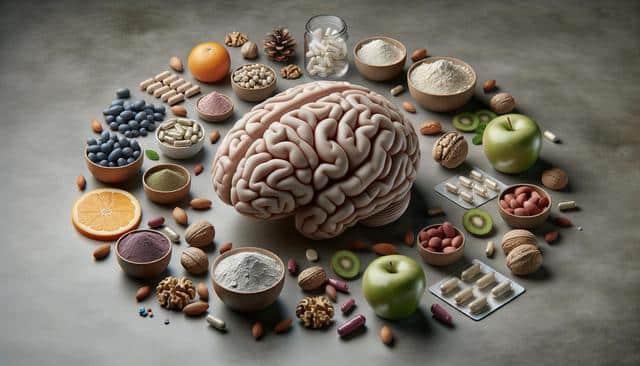Natural Nutrients That May Support Brain and Memory Health
Vitamins and supplements may support brain and memory health, including ingredients like omega-3s, B-vitamins, and ginkgo biloba. Learn how these natural options could enhance focus, recall, and mental clarity when used as part of a healthy lifestyle.

The Role of Omega-3 Fatty Acids in Brain Function
Omega-3 fatty acids, particularly DHA and EPA, play a critical role in maintaining brain structure and function. DHA is a major structural component of the brain’s gray matter and is vital for the health of neurons. Consuming omega-3s through diet or supplements may contribute to improved cognitive performance and memory retention. Research has shown that individuals with higher levels of omega-3s often demonstrate better brain volume and reduced signs of cognitive aging.
Sources of omega-3s include:
- Fatty fish like salmon, sardines, and mackerel
- Flaxseeds and chia seeds
- Walnuts and algae-based supplements
Incorporating these into a balanced diet or choosing a supplement can be a natural way to support long-term brain health, especially when combined with regular mental and physical activity.
B-Vitamins and Their Impact on Cognitive Clarity
B-vitamins, particularly B6, B9 (folate), and B12, are essential for brain development and function. These vitamins help regulate homocysteine levels, an amino acid linked to cognitive decline when elevated. By maintaining healthy levels of B-vitamins, individuals may experience improved mental clarity and reduced fatigue.
These nutrients support the production of neurotransmitters such as serotonin and dopamine, which are necessary for mood regulation and mental balance. A deficiency in B-vitamins may lead to memory problems or difficulty concentrating over time.
Natural sources include:
- Leafy greens like spinach and kale
- Eggs and dairy products
- Whole grains and legumes
Supplementation might be considered when dietary intake is insufficient or when age-related absorption issues occur, especially for older adults.
Ginkgo Biloba: An Herbal Support for Memory
Ginkgo biloba is one of the most studied herbal supplements for cognitive support. Derived from the leaves of the ginkgo tree, this natural ingredient is believed to enhance blood circulation to the brain, potentially improving memory, focus, and mental sharpness. Some studies have found that ginkgo may support cognitive performance in older adults and individuals with mild memory concerns.
Potential benefits of ginkgo biloba include:
- Increased oxygen and nutrient delivery to brain cells
- Antioxidant properties that protect against free radical damage
- Support for mood and stress response
As with any supplement, it’s important to consult a healthcare provider, especially when taking medications, to ensure safety and compatibility.
Antioxidants and Brain Protection
Oxidative stress is a major contributor to aging and cognitive decline. Antioxidants such as vitamin C, vitamin E, and polyphenols help combat free radicals, protecting brain cells from damage. These nutrients can be found in a variety of fruits, vegetables, and plant-based foods, as well as in supplement form.
Regular intake of antioxidants may support:
- Reduced inflammation in the brain
- Improved neural communication
- Slower age-related cognitive changes
Examples of antioxidant-rich foods include berries, dark chocolate, green tea, and leafy vegetables. Including a variety of these in the diet can be a simple and effective way to support brain health naturally.
Lifestyle Integration for Cognitive Support
Supplements and vitamins can be helpful, but they are most effective when used in conjunction with a healthy lifestyle. Diet, exercise, sleep, and mental engagement all contribute to cognitive wellness. A holistic approach ensures that the brain receives the nutrients and stimulation it needs to function optimally.
To support brain health naturally, consider the following practices:
- Engage in regular physical activity to enhance blood flow to the brain
- Follow a nutrient-rich diet that includes brain-friendly foods
- Prioritize quality sleep to allow for memory consolidation
- Challenge your brain with puzzles, reading, or learning new skills
When combined with appropriate supplements, these habits create an environment where brain performance and memory retention can thrive over time.
Conclusion: Nurturing Cognitive Wellness Through Natural Means
Caring for brain and memory health doesn’t have to rely solely on medical interventions. By including specific nutrients like omega-3s, B-vitamins, ginkgo biloba, and antioxidants, individuals can take a proactive and natural approach to cognitive support. These supplements, when used responsibly and paired with a balanced lifestyle, may help maintain focus, mental clarity, and memory function as we age. As always, it’s important to consult with a healthcare professional to determine what combination of nutrients and practices is most appropriate for individual needs and health conditions.